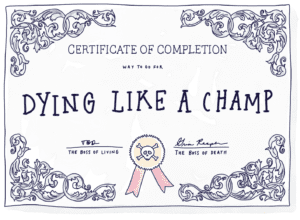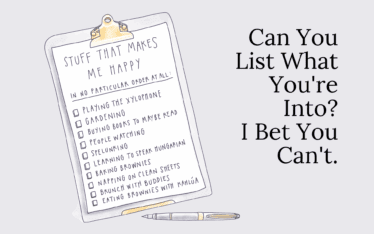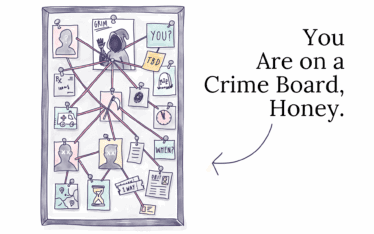Let’s face it: we are all headed for the same place (well, that’s not entirely true — some of you will burn in the flaming embers of hell for all of eternity — fingers crossed I don’t see you there), and we can either do this Totally Inevitable Death thing like gold medalists, or do it shabbily and feel woefully incomplete as we bite the biscuit.
Wouldn’t you rather die a good death?
The way we live often dictates the way we die; if we live by the sword, chances are we’ll die by the sword kind-of-thing. We can be deliberate and intentional about the way we live, and just as much so about the way we die. How can we make our grand finales… more grand?
Top 10 ways to die like a champ:
1. Leave it all out on the field.
Getting a paltry participation ribbon at the end might feel like a pity prize, no? When it comes to your life, are you playing to win, or are you playing not to lose? 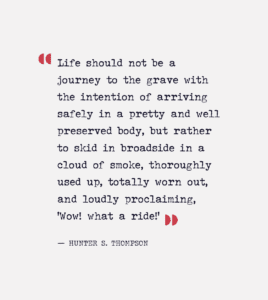 Taking risks or playing it safe? Are you “skidding [into your grave] broadside in a cloud of smoke”, like Hunter S. Thompson advises? Getting to the end and feeling like your life was left unlived is precisely what fills the Grim Reaper’s soul. (We are not aiming to fill the Grim Reaper’s soul here — just stating the obvious.)
Taking risks or playing it safe? Are you “skidding [into your grave] broadside in a cloud of smoke”, like Hunter S. Thompson advises? Getting to the end and feeling like your life was left unlived is precisely what fills the Grim Reaper’s soul. (We are not aiming to fill the Grim Reaper’s soul here — just stating the obvious.)
2. Use your gifts and then wrap them up and give them away.
That sounds cute but confusing, so please allow me to clarify: the world needs more of what you have to offer. If you have the ability to make great art, please make great art for others to enjoy. If you have a strategic mind, please get a job where you can be seven steps ahead so others can learn from you. If you are an exceptional hairstylist, please give the rest of us exceptional hair days. If you play the pan flute like no one else, play away please never play the pan flute; no one must ever play the pan flute unless it’s for a practical joke.
What are you talented at, and how can you bring joy to others by using those strengths/ special skills? When you use your gifts you inspire other people to do what makes them shine, too. Talent is generative. If you die with your proverbial paintbrushes dried up because you let your talents dwindle, the Grim Reaper gets a point, and you, well you die with no points.
“Don’t ask what the world needs. Ask what makes you come alive, and go do it. Because what the world needs is people who have come alive.” —Howard Thurman
3. Be you, through and through.
Palliative care nurse Bronnie Ware shared in The Top Five Regrets of the Dying the number one regret of the terminally people she cared for at the bitter end: they wished they’d had the courage to live a life true to themselves, not the life others expected of them.
Are you living a life for someone else? Might you need to summon a wee bit of courage to make your own choices, even if it (brace yourself here, Ms. Pleaser) disappoints some of the people around you? Maybe you wanted to be an archaeologist and that flied in the face of your parent’s dream for you to be a perennially-unhappy-but-financially-stable lawyer? Fly in their face! Maybe you don’t even know what a “true to yourself” kind of life even is, and that scares the shit out of you? It’s all stuff you can solve. Aging and dying: unsolvable. Living life like you mean it: in the realm of solvability.
4. Take care of the annoying details.
It can be annoying to tend to the administration of you not being here one day. You know what else is annoying? Saddling your loved ones to figure out if you want to be resuscitated when you stop breathing, who gets the grandfather clock, and whether you really wanted to leave the bulk of your estate to Kitty’s Shelter for Wayward Cats (because even the feral cats need love). Set aside an annoying afternoon to arrange your affairs (I like what the people at Lantern are doing) and then go celebrate that night with an “I’m Not Dead Yet but Boy am I Prepared” party. (This article is also helpful to figure out all that needs figuring out.)
How do you want your funeral/ memorial/ “Jimmy Killed This Thing Called Life” keg party to be? You’ll die like a champion if your family/ love ones/ Kitty from the shelter aren’t haranguing you on your deathbed for all the gory details.
5. Consider your legacy.
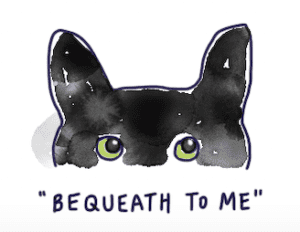 Research shows that many older adults report a fear of obliteration, of being forgotten after they’ve gone onto greener pastures. This comes as no surprise; in about 100 years (or less!) for most of us, it’s highly possible that no one will ever know we existed. To offset this supremely depressing notion, many of us are inclined to leave legacies that let us (delusionally) live beyond the boundaries of our lifespans — creating a kind of symbolic immortality. “If my name is on the east wing of Kitty’s Cat Shelter, my contribution will live on forever.” “My kids will talk to their kids about me, and sometimes even with fondness!” “Writing this book about irrigation techniques for small scale farmers means my voice will echo for generations to come.” Irrational? Yes. Effective? We do what we can in the face of existential despair.
Research shows that many older adults report a fear of obliteration, of being forgotten after they’ve gone onto greener pastures. This comes as no surprise; in about 100 years (or less!) for most of us, it’s highly possible that no one will ever know we existed. To offset this supremely depressing notion, many of us are inclined to leave legacies that let us (delusionally) live beyond the boundaries of our lifespans — creating a kind of symbolic immortality. “If my name is on the east wing of Kitty’s Cat Shelter, my contribution will live on forever.” “My kids will talk to their kids about me, and sometimes even with fondness!” “Writing this book about irrigation techniques for small scale farmers means my voice will echo for generations to come.” Irrational? Yes. Effective? We do what we can in the face of existential despair.
What do you want to leave behind — your collection of Ming vases? Your values and beliefs? Your wads of cash? Your sperm? Your wood carvings? Your wisdom? Maybe nothing, and that’s okay too — but get clear now about how you’d like to pass on the essence of yourself. The Grim Reaper loves it when we fret near the end about how there’ll be nothing to show for our 80-ish years of walking on the earth, apart from a few fading footprints.
6. Make peace with your spirit in the sky.
You don’t have to find religion per se (although studies show that religiousness does help offset the fear of death), but you might want to come to terms with what you believe before you’re on the precipice of meeting your maker, so to speak. Dying has an uncanny way of stirring the spirituality pot, according to end-of-life caregivers.
What does “spiritual health” mean to you (because there’s no right or wrong and you get to pick from Athiesm to Zoroastrianism)? How can you live with a clean bill of spiritual health in the days and years leading up to your death… rather than clawing for a confessional mere moments before you flatline?
7. Mend what needs mending and say what needs saying.
Palliative care doctor Ira Byock tells us in The Four Things That Matter Most that there are four messages we need to communicate on our deathbeds for comfort and closure: “Thank you,” “I love you,” “I forgive you,” and “Please forgive me.” Hold up here, guys; I know you’re thinking what I’m thinking. Why wait to say these essential things until we’ve got one foot in the grave? Why not say these things today? Save the deathbed drama for more pressing matters (like how much morphine you can get your hands on), not by having to tell your cousin Tina you forgive her for stealing your high school boyfriend and losing your favorite Vuarnet t-shirt. Tina needs absolution (she’s been riddled with guilt for years), and you need the catharsis of forgiveness — all well before the bitter end.
8. Widen your life.
We make our lives wider when we stuff them full of all the vitality we can jam in… all the pleasures, all the experiences, all the kinds of chocolate (yes, even dark chocolate). Are you maxing out on the joie de vivre scale (ranging from being in a Netflix coma, all the way to feeling like you emptied the tank of life)? I went on and on in a three-part series (here’s part one, part two, and part three) for ways to stratospherically soar the vitality in your life. Stuff it all in before you go. Imagine getting to the end and lamenting that you didn’t get to go on just one more roller coaster ride? Or that you didn’t try that new cocktail bar that opened up around the corner? Or that you didn’t quit work 20 minutes earlier each day to enjoy almost seven extra hours a month to do ANYTHING OTHER THAN WORK? Or that you didn’t feel… alive enough?
9. Deepen your life.
This is the complementary counterpoint to widening your life with vitality — this is all about deepening your life with meaning. This includes feeling like you have some sense of purpose beyond being a parasite on this earth… maybe tapping into spirituality… helping other people… connecting any of the dots in the universe to come up with some kind of cohesive reason why you are here and why you are putting cover pages on proposals at work… yes, some pretty deep shit.
To what extent do you feel like you’re living with purpose? Does your work feel fulfilling, beyond earning money and getting to buy shoes with nice names on the soles? If you’re at death’s door and you feel like your life was a mile wide (go, vitality!) but just an inch deep, you might want to work on the meaning part to ultimately die with depth.
10. Take your head out of the sand.
Face the facts, friend. You have an expiry date, I have an expiry date, Whiskers your cat has an expiry date, and your carton of milk in the fridge has an expiry date. We’re all just hoping that the milk goes first. Herman Feifel, the father of the modern death movement (didn’t even know there was a modern death movement? It’s okay, just stick with me, grasshopper) said, “We pay expensively for the taboo we affix to the subject of death.”
If you’re feeling squeamish about your inevitable expiry, studies show you’re likelier to be anxious, depressed, have lower self-esteem, and pretty much everything that’s the opposite of people who neutrally accept death, because they tend to experience more life satisfaction and meaning. A genuine understanding of our own mortality is seen to have profound psychological benefits and can be a catalyst for growth, whereas fearing death can apparently kill us before we die. How can you face up to the reality in front of you? Developing a rapport with death and dying helps (attend a death cafe), planning for it helps, and living with more gusto helps (because people with a fear of living un-lived lives tend to fear death more than the Average Joe or Jane). “Apprentice yourself to the curve of your own disappearance,” said David Whyte, and we could all benefit from apprenticing ourselves with the inescapable truth.
We can’t conquer death, but we can be victorious with how we live and set the stage for a all-things-considered happy ending. Mark Twain eloquently said, “Let us live so that when we come to die even the undertaker will be sorry.” We can sure as hell die trying.
